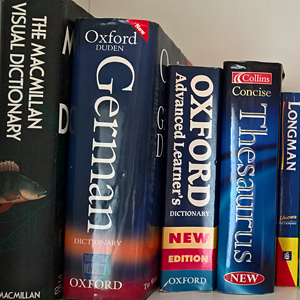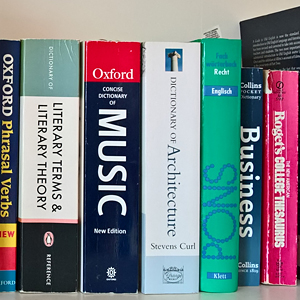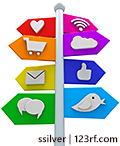 As a teenager, I had quite a quirky hobby; I loved to browse and read dictionaries! (Like other people would read books or magazines.)
As a teenager, I had quite a quirky hobby; I loved to browse and read dictionaries! (Like other people would read books or magazines.)
To give you a bit of context, this was back in the early nineties. The internet wasn’t really a thing yet and I was in boarding school with a limited choice of hobbies avalable ;-)
My first dictionary was a bilingual German / English one and it was probably just as well that I only had this one dictionary to start with, because quite soon, I became a bit obsessed with learning new words and spent way too much time reading and browsing. Had I known back then about all the other types of dictionaries I’m about to introduce to you now, I probably would’ve been in a lot of trouble :D
A dictionary is a very useful tool for learning a language. However, if you are just using a bilingual dictionary, you are missing out! Which other English language dictionaries do best suit your needs? Find out here:
Bilingual dictionary
To start with, a bilingual dictionary is very useful, as it explains new vocabulary in both your native language and in English. It is a really useful tool for beginners!
For example: Langenscheidt Universal-Wörterbuch Englisch | Oxford German Dictionary (Amazon affiliate links)
Monolingual dictionary
Once you have mastered the basics, you should also get a monolingual (English - English) dictionary. Here, everything is explained in English. A good monolingual dictionary offers a lot of information on how a word is used in context (usually with an example sentence). This is especially important in English, as some words can have a lot of different meanings, depending on the context.
Once you're at pre-intermediate level, it's a good idea to always check your monolingual dictionary first, and only use your bilingual dictionary when the English explanation wasn't sufficient or too difficult to understand. It will help your language fluency a lot!
For example: Oxford English Dictionary | Longman Dictionary of Contemporary English (Amazon affiliate links)
Children's / school dictionary
If you are looking for an easier monolingual dictionary, you could use a children's / school dictionary instead! School or children's dictionaries offer simpler and shorter word definitions. So instead of getting frustrated, and switching back to your bilingual dictionary, you could try a school dictionary instead!
For example: Collins School Dictionary (Amazon affiliate link)
Specialist vocabulary
Maybe you need a lot of specialist vocabulary (for your job, university, personal interest etc.), or are interested in a particular section of the English language. There are a lot of great specialist or technical dictionaries out there, both bilingual and monolingual. Examples are: Business English dictionary, phrasal verb dictionary, idioms dictionary, financial English dictionary etc. ...
Other useful language helpers you should consider:
 Thesaurus
Thesaurus
If your level is intermediate and above you should invest in a thesaurus! A thesaurus offers you synonyms (words that have the same or a similar meaning) and sometimes antonyms (words that mean the opposite). A thesaurus is a great help, if you want to spice up your writing. A thesaurus doesn't offer example sentences! So to use it effectively, you need to be aware of the appropriate context. (Which again, you could check in your monolingual dictionary ;-) )
For example: Roget's Thesaurus of English Words and Phrases | Oxford Paperback Thesaurus | (Amazon affiliate links)
Collocation dictionary
A collocation dictionary shows you common word combinations (e.g. 'heated discussion') and how to use them. Using a collocation dictionary will help you to write and speak more naturally.
For example: Longman Collocations Dictionary and Thesaurus (Amazon affiliate link)
Visual dictionary Another, really useful tool is a visual dictionary! There are both monolingual and bilingual versions available. My favourite is the Macmillan Visual Dictionary which is unfortunately no longer available. But Merriam-Webster seems to have a really nice one too: Merriam-Webster Visual Dictionary (Amazon affiliate link)
This type of dictionary helps you to find information about a word you can picture, but do not know the word for it, or vice versa (the other way round). It will increase your vocabulary by adding more and more specialist terms you didn't even know existed before ;-) Visual dictionaries are a great resource!
This list is by no means exhaustive, but I hope it provided you with a useful overview of the different kinds of dictionaries.
This blog post contains Amazon affiliate links.
Article updated on: 7.7.2020
If you liked this blog post, please share it on social media:
Don't want to miss any future blog posts? Subscribe to my monthly newsletter!
Picture copyright: Nicole Heusser
 Instagram
Instagram